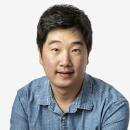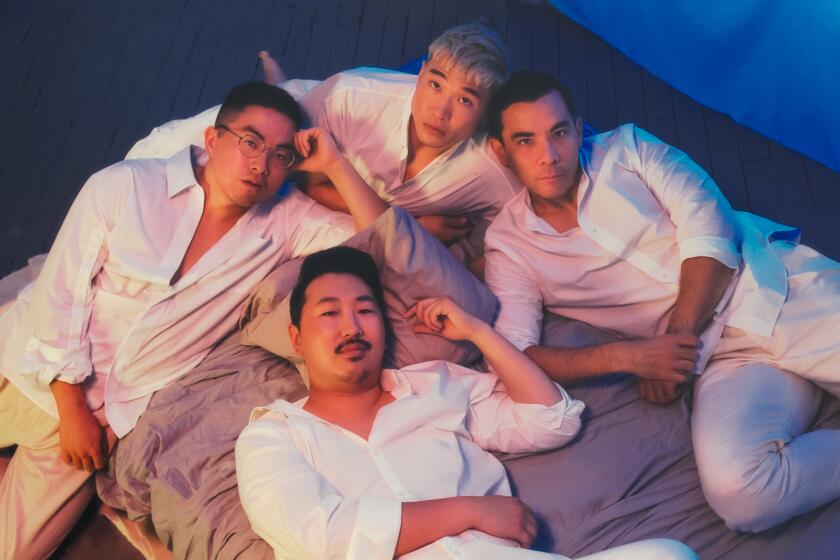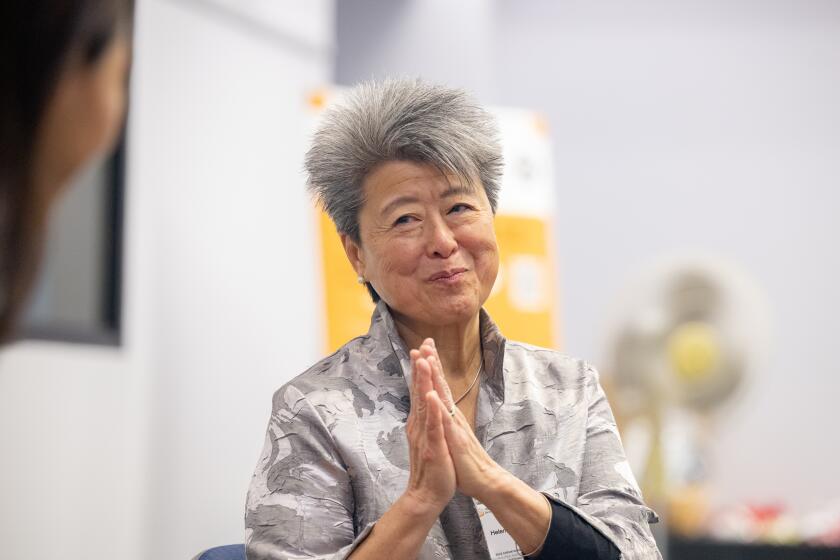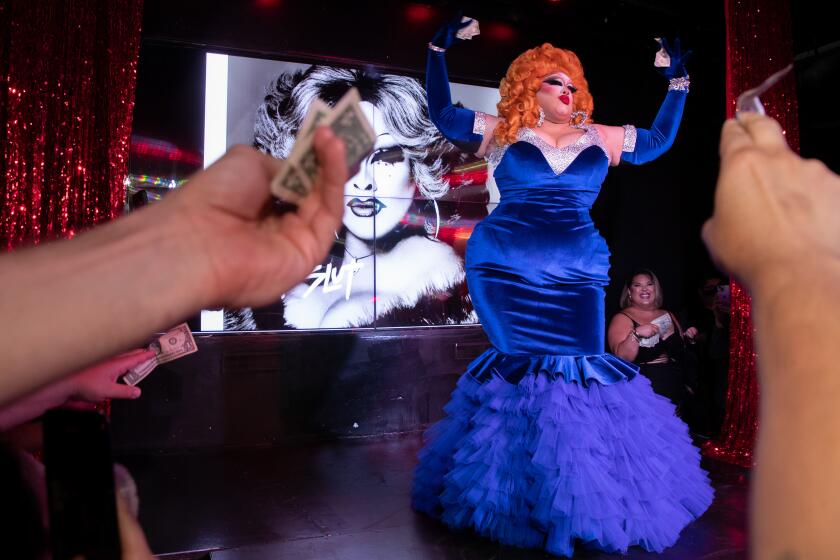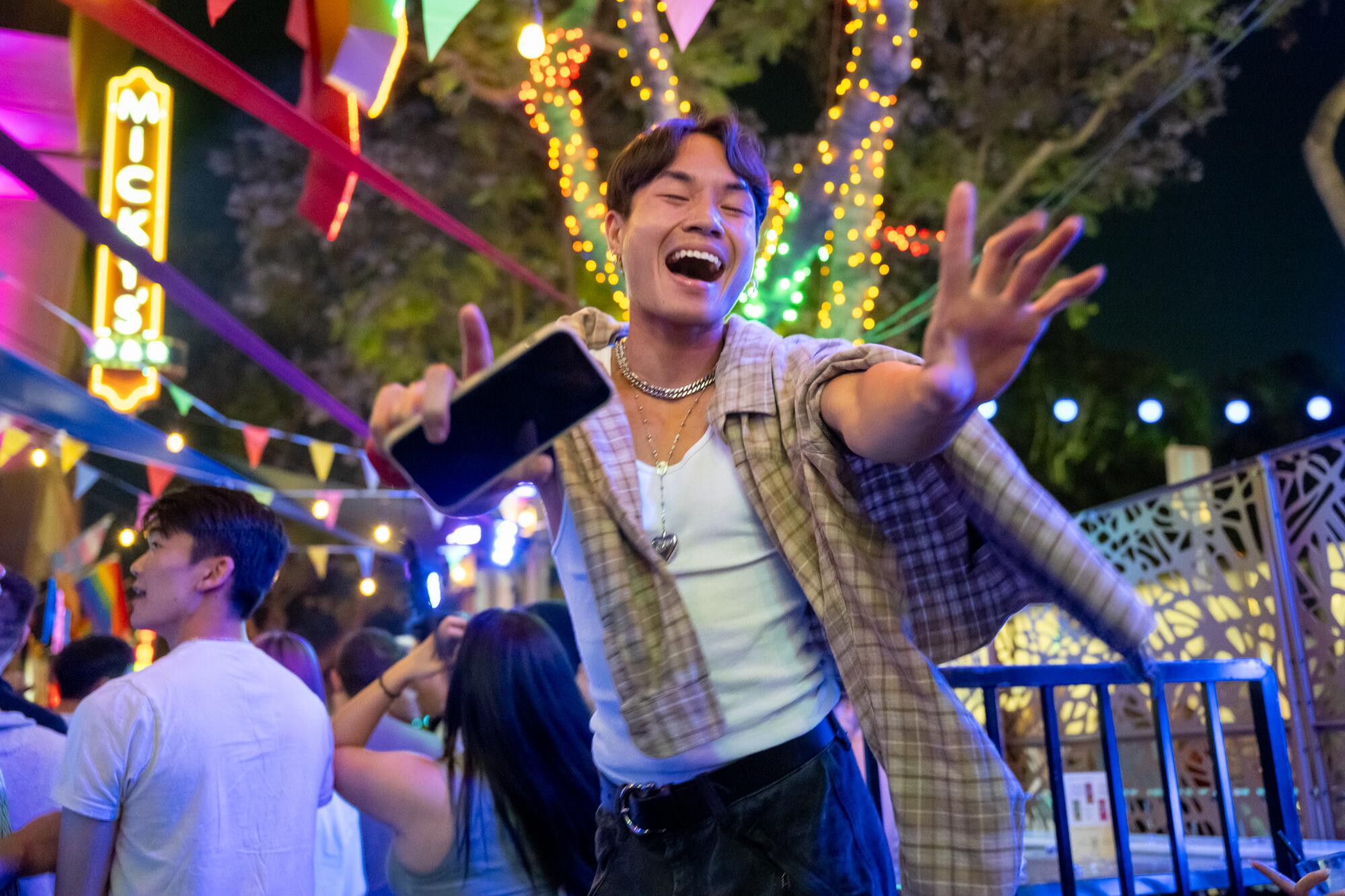
- Share via
Andrew Ahn’s father once told him that there were “no gay people in Korea.”
Ahn was so afraid of his parents’ reaction if he came out to them that he had a backpack and a friend on standby in case he needed to leave.
In a culturally conservative community, where going to church and building a family were heavily emphasized, Ahn felt his gay identity kept him “from being able to participate in Korean culture.”
Then, he started frequenting GAMeBoi, a weekly Asian American gay party at West Hollywood’s Rage Nightclub.
There, he didn’t have to worry about being judged by straight Asian Americans or fetishized by “rice queens” — older white men attracted to much younger Asian men. He learned to embrace being both Korean and gay, so much so that he directed “Fire Island,” a groundbreaking queer Asian American rom-com released last year.
Writer and star Joel Kim Booster feared he’d have to ‘protect’ his deeply personal film from criticism. Instead, it found legions of adoring fans.
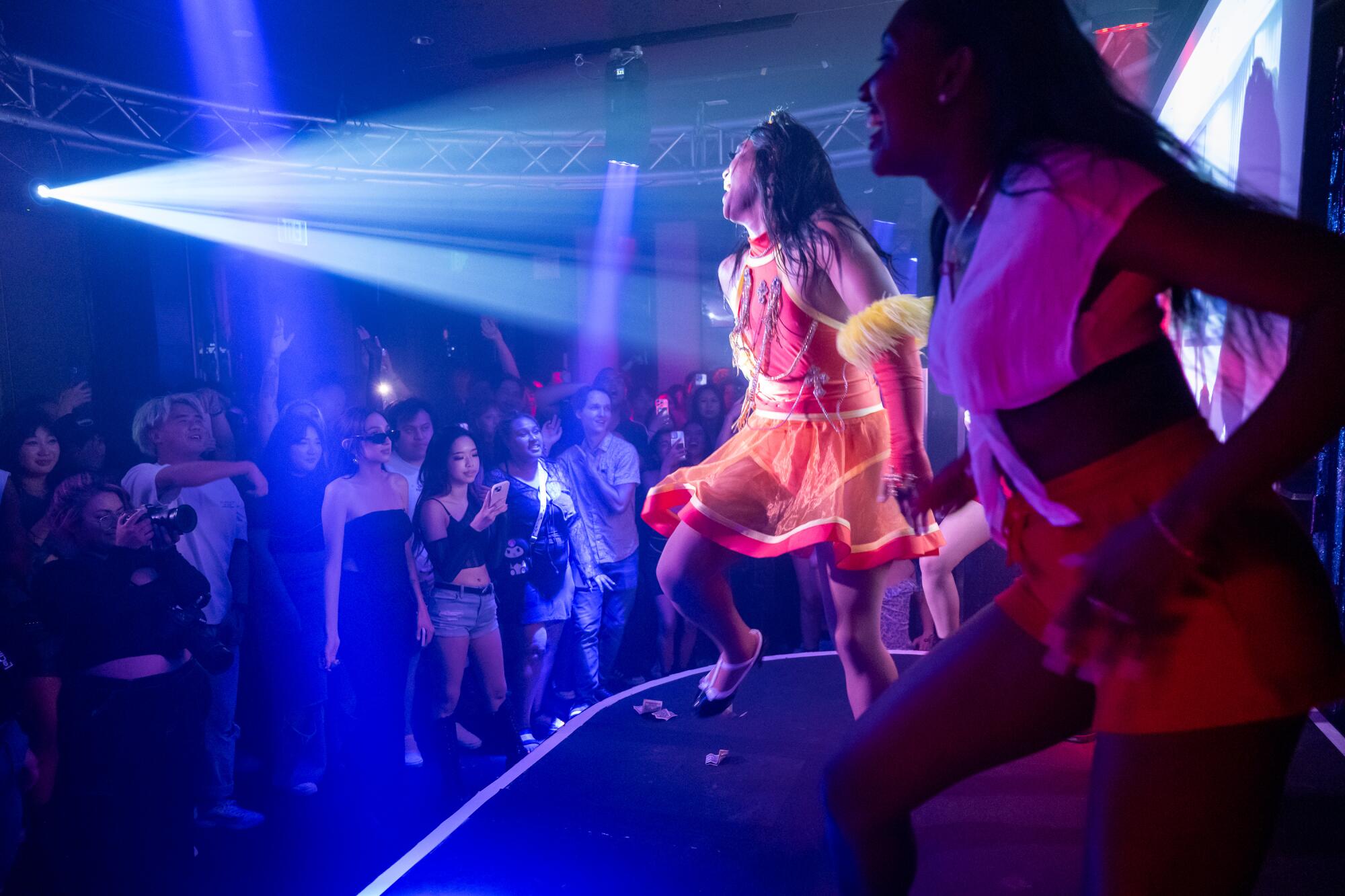
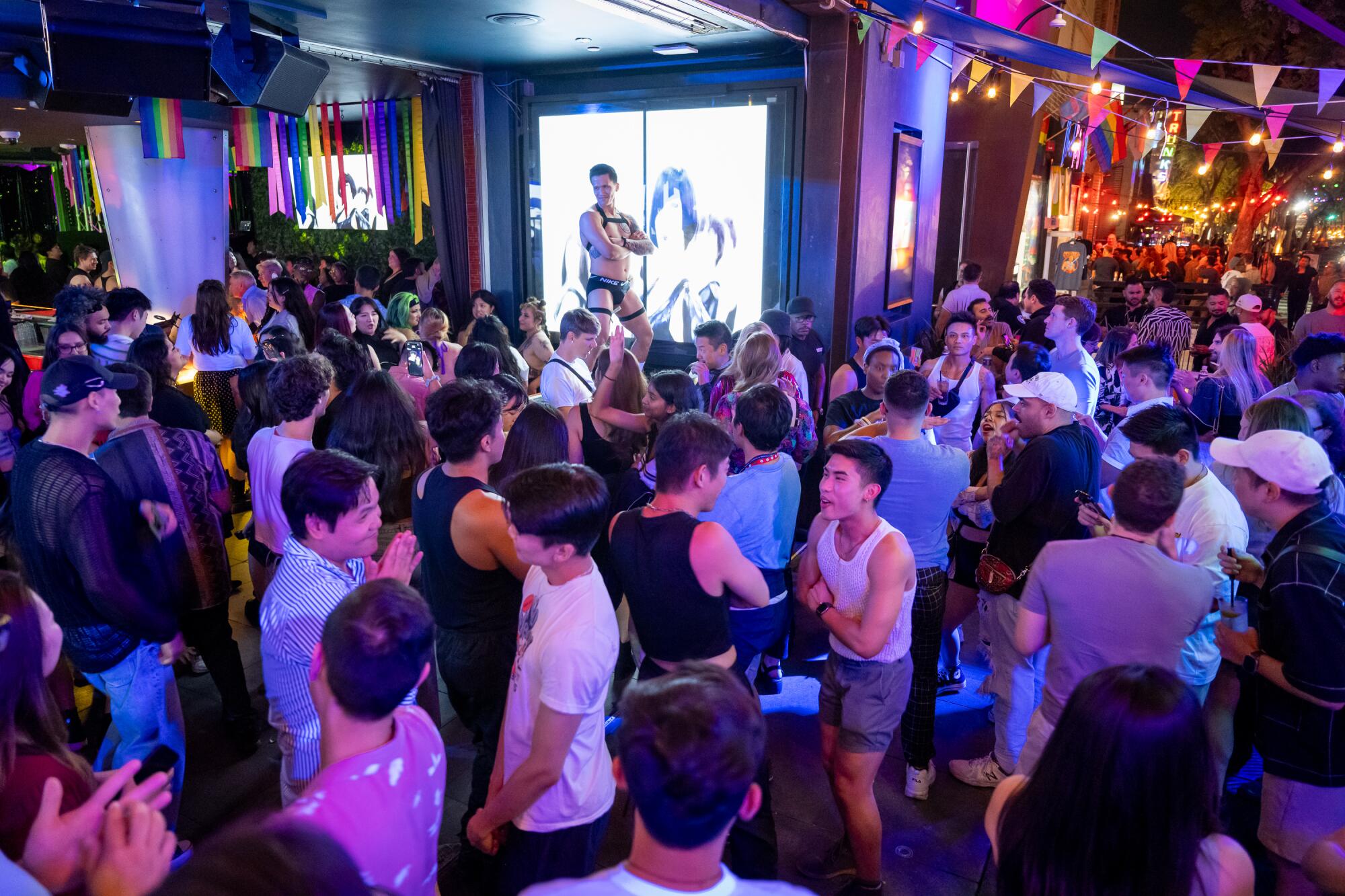
After about two decades, GAMeBoi shut down at the height of the pandemic in 2020. To replace it, club parties and other gatherings have emerged, allowing LGBTQ+ Asian Americans to connect with one another free of judgment at a time of anti-Asian hate crimes and legislation targeting non-straight people.
Being Asian American and LGBTQ+ can feel lonely, with institutions such as ethnic churches often disavowing non-heterosexual relationships while traditional LGBTQ+ spaces such as gay bars can be unwelcoming to people of color.
But the community is becoming visible — California now has an out Asian American congressman and state legislators — and partying in person remains an important way to connect, even in an online age.
“Finding places like GAMeBoi, where being queer and Asian does co-exist … It’s not like a 1,000-year-old Korean cultural ritual, but I could create a new ritual,” said Ahn, 37.
Though hardly a household name to the general public, Helen Zia is a trailblazer — to some, a legend — in the fight for Asian American civil rights.
On a recent Friday, hundreds packed QT Nightlife’s monthly K-Pop Night at Micky’s, a West Hollywood gay club a block or so east from the old GAMeBoi site.
Some posed for selfies in a pink Barbie box with disco balls hanging overhead. Many danced and sang along to K-Pop hits spun by a DJ.
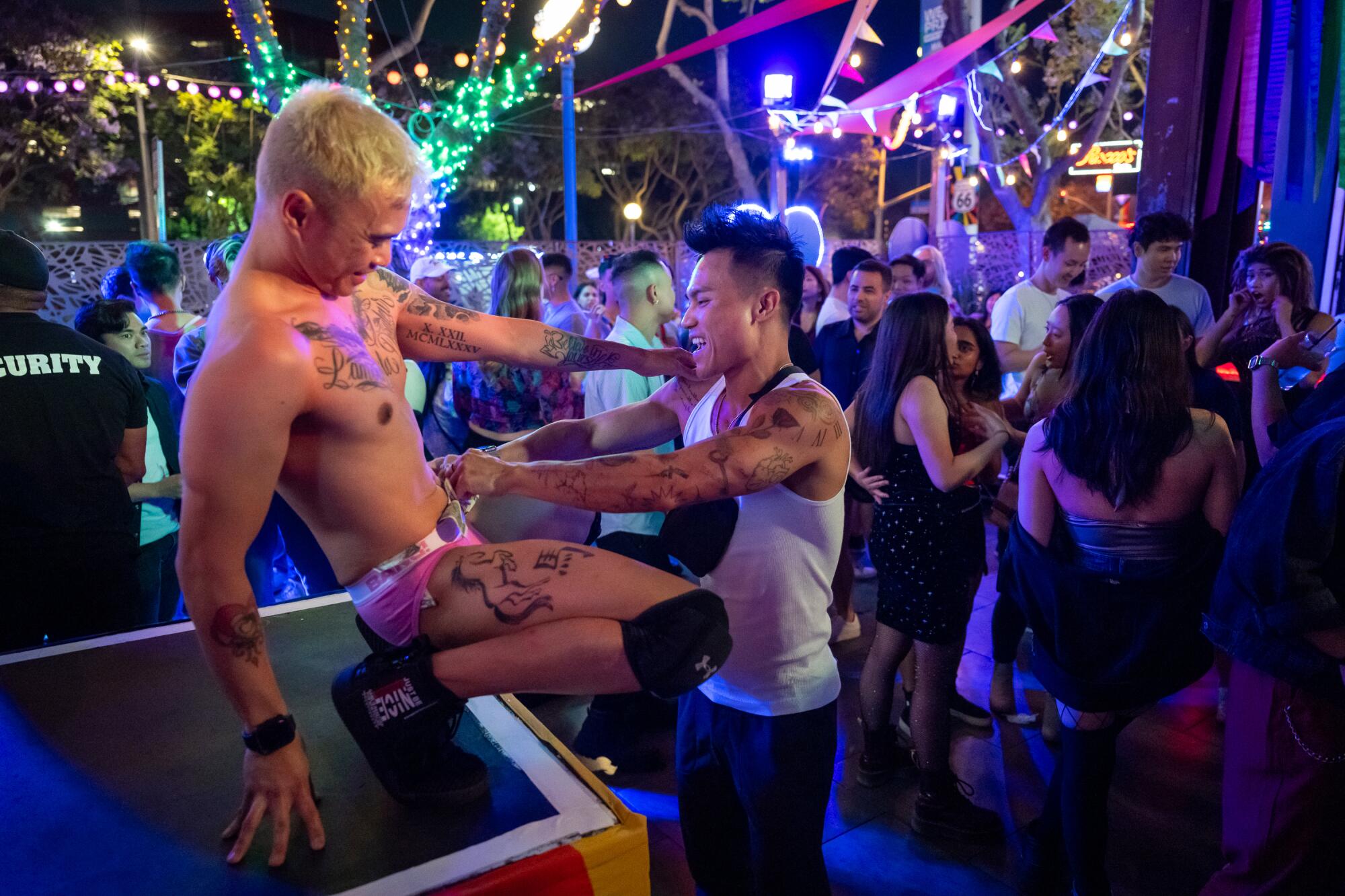
Jeff Caesar Lausple, a 32-year-old in the shipping industry who was working the room as a go-go dancer, thrust his hips and went down on his knees to BTS’ “Dope” as people slipped dollar bills into his light pink briefs.
Danny Pham, a 37-year-old founder of QT Nightlife, said he wanted to create a space where Asian American LGBTQ+ people could belong.
The company also hosts Switch, a monthly event with themes such as “Songkran Splash” to celebrate the Thai New Year and “Will Ube Mine” in honor of Filipino American History Month.
“Being able to represent [Asian Americans] is so important, because then people will see us in a different light,” said Liam Shi, QT Nightlife’s Southern California regional manager. “If we get our face out there, then people will start taking us a little more seriously.”
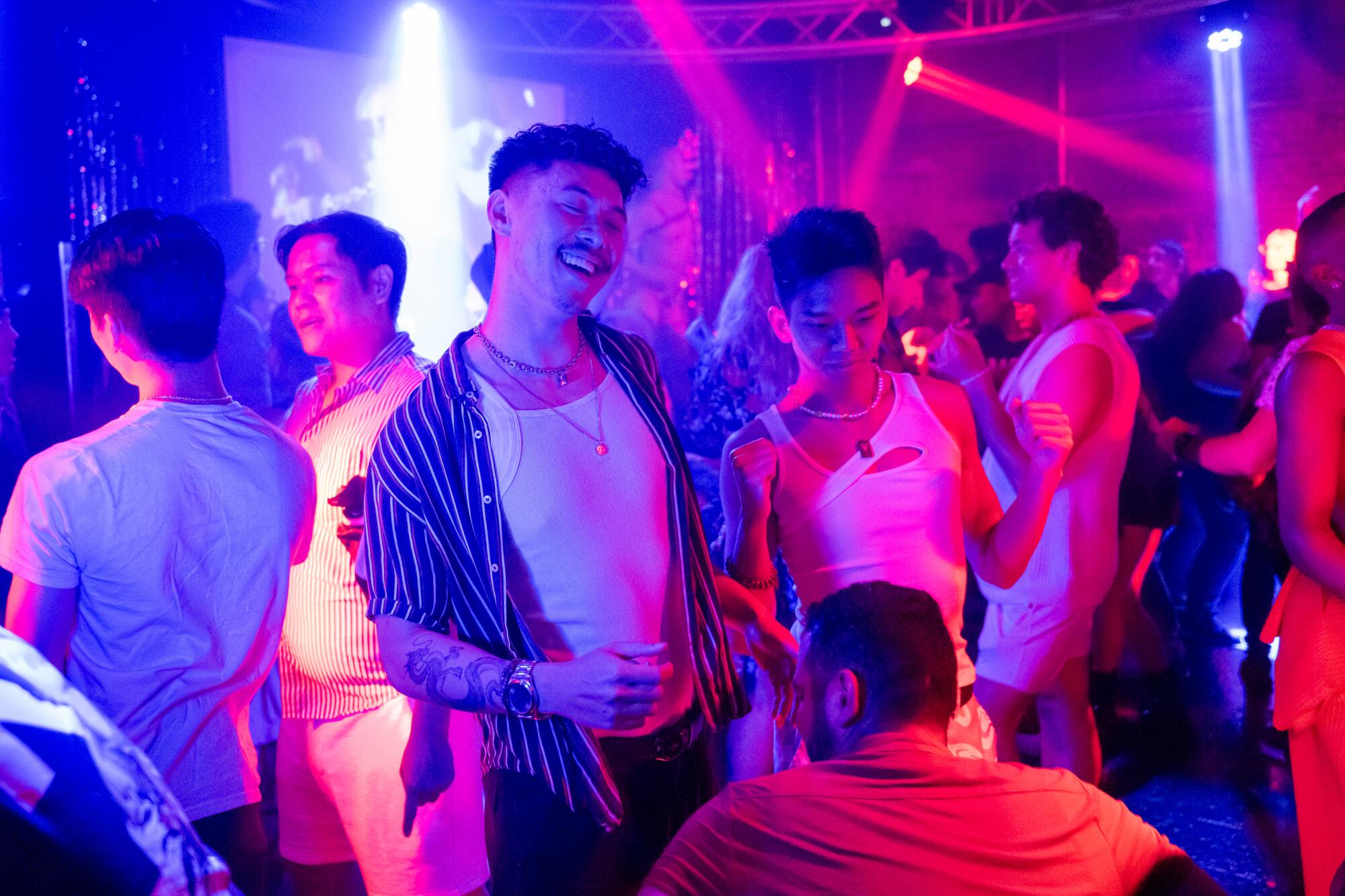
Even in historically gay neighborhoods like West Hollywood or San Francisco’s Castro district, Asian Americans have long been ignored or fetishized, seen as feminine and weak.
In 2019, then-West Hollywood Mayor John Duran argued that he did not inappropriately touch a member of the Gay Men’s Chorus of Los Angeles because “he’s a skinny Korean kid with pimples on his cheek.”
Asian American advocacy groups criticized Duran’s remark, with API Equality-LA pointing to the long history of discrimination against Asian men in gay communities such as West Hollywood, whose clubs “used to require three forms of photo identification from anyone they perceived as Asian.”
Duran eventually resigned from his position as mayor, citing health reasons, after several other allegations of sexual harassment.
Miss Shu Mai, a Taiwanese American drag queen who hosted the K-Pop Night, recalled seeing white actors in yellowface — makeup that made them look East Asian in L.A.’s drag scene. She said she rarely goes to West Hollywood, except for QT Nightlife and other queer Asian events. While working at a mobile HIV testing van in the city, she was sexually and verbally harassed, she said.
Events like the K-Pop Night are “liberating,” said Shu Mai, who also hosts Send Noodz, an Asian American/Pacific Islander drag party, with fellow queen Bibi Discoteca.
Despite an ongoing culture war, L.A.’s thriving drag scene is bursting with queens, kings, things and rebellious spirit.
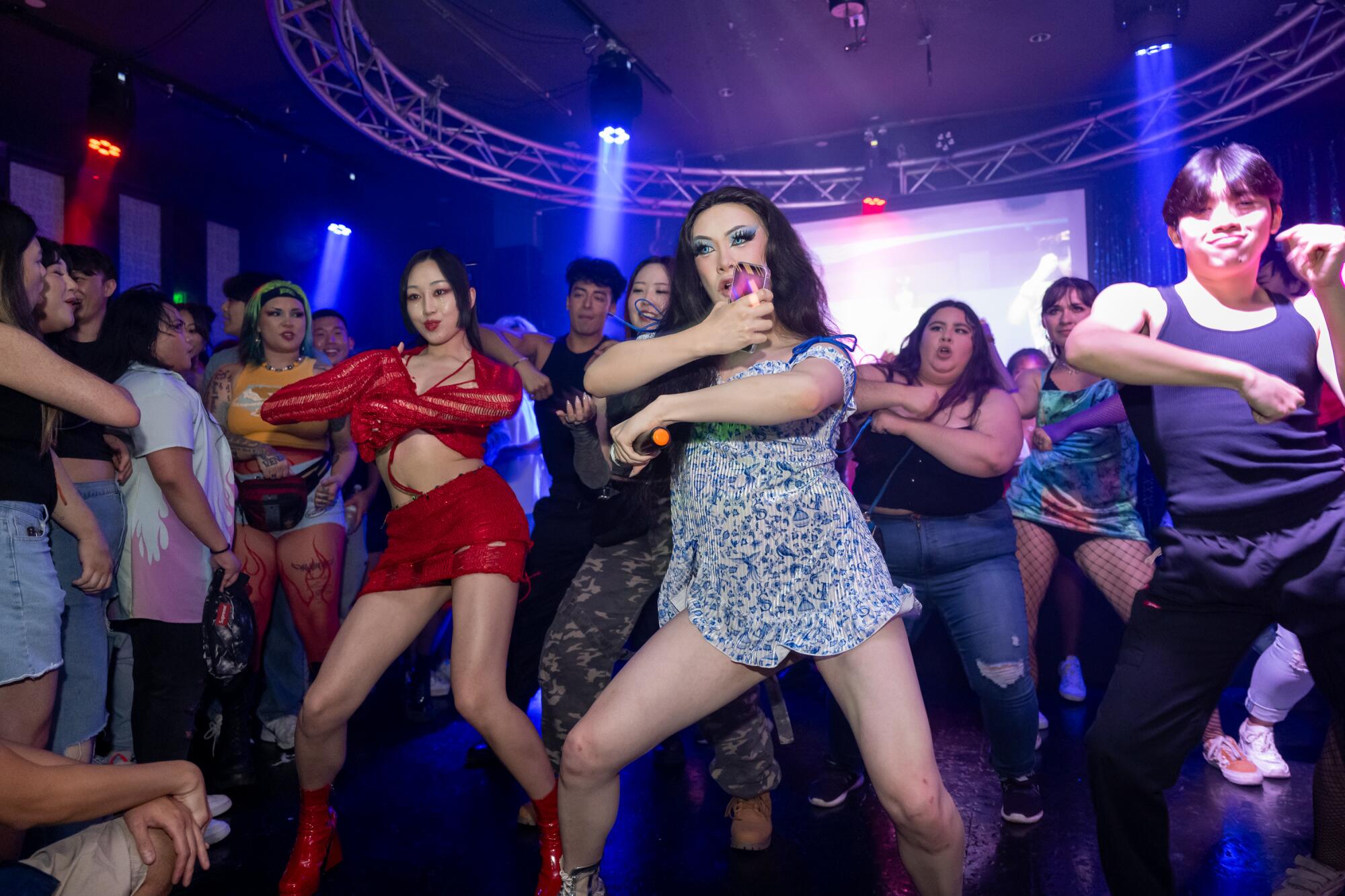
In one of her earlier appearances at GAMeBoi, Shu Mai fed people egg rolls and handed out red envelopes, a Lunar New Year tradition, with condoms in them.
“You feel seen in those spaces regardless of who you are,” she said. “It was so unapologetically Asian for me, and it was one of the first times my art encapsulated all of who I was.”
As Jonathan Jae-an Crisman sees it, these parties are making a statement. In early 2020, he and four others launched QNA, which regularly hosts events and parties geared toward the community.
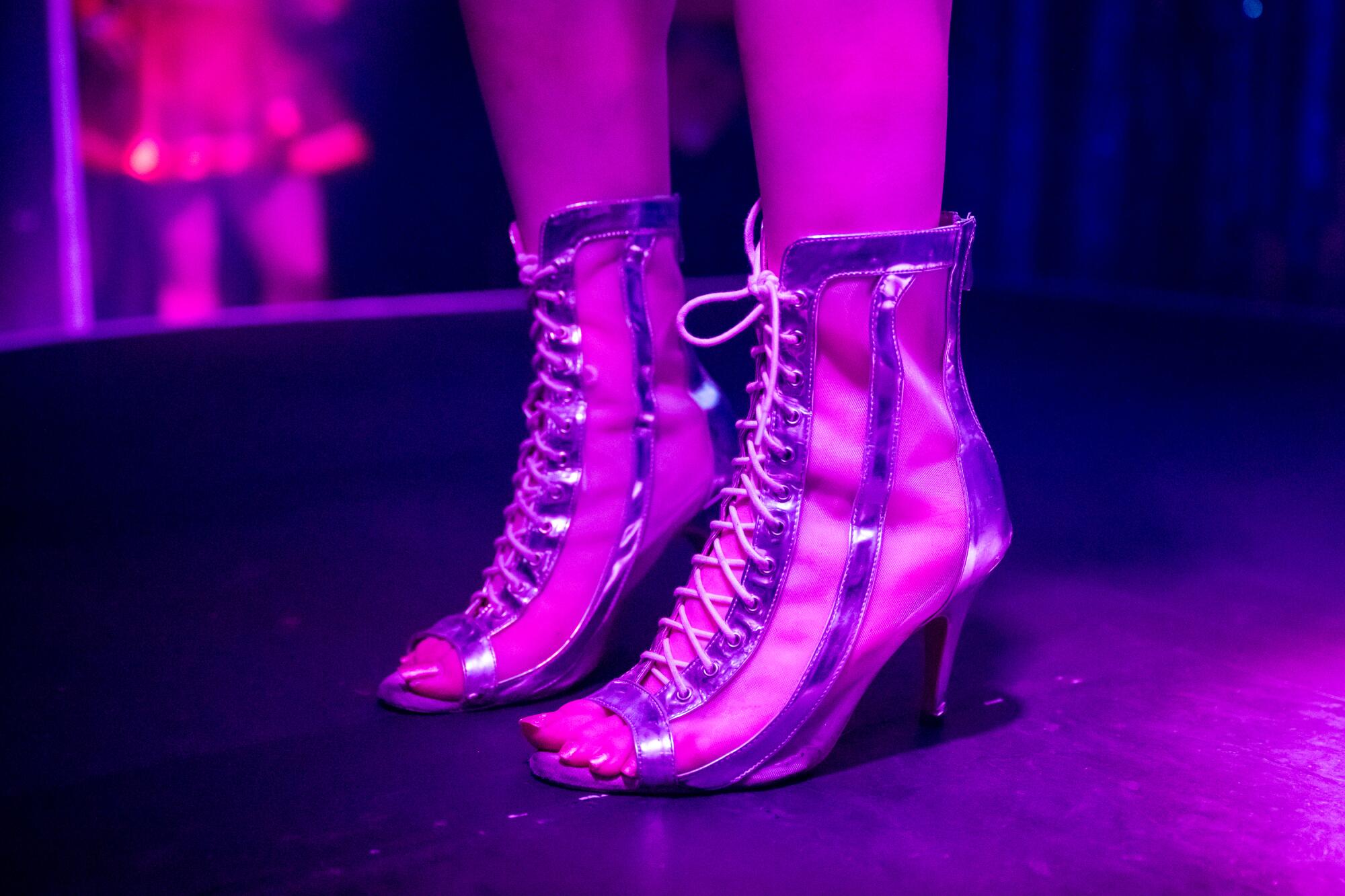
“In a time when there is anti-Asian hate and it feels like the whole world is crumbling … what’s more revolutionary politically than dancing, having a good time and loving one another?” said Crisman, a 36-year-old gay Korean American researcher and artist. “It’s a heavy world out there. People need space just to be free and be themselves.”
AP Qazi was beaming with excitement as he prepared for L.A.’s first South Asian Pride Night in late June. Hundreds planned to dance to Bollywood songs, cheer South Asian drag kings and munch on biryani rice and samosas.
Qazi, a 35-year-old transgender man, first attended the South Asian LGBTQ+ nonprofit Satrang’s family day picnic at Griffith Park a year and a half ago after seeing an Instagram post.
There, he met an older South Asian queer person for the first time — a reminder that he did not have to feel “like the black sheep” of his community. He had planned to just stop by but ended up staying for about five hours.
“I felt shame to my community for being queer,” he said. But “seeing other South Asian queer people living and thriving and embracing their joy gave me the permission to do the same,” he said.
The topic of the radio talk show was love, and the newlyweds sitting side by side behind studio microphones were brimming with it.
QNA, Send Noodz and Queer Asian Social Club together hosted a party for Ahn’s “Fire Island.”
“I’m really happy for these new spaces and that young people have them,” said Ahn, who is looking to develop a film about GAMeBoi. “And that they can serve a similar function that GAMeBoi did for me.”
After Ahn came out, his parents ultimately became supportive, even attending a “Fire Island” screening for the cast and crew. Spaces like GAMeBoi helped Ahn strengthen his relationship with them by giving him the confidence to be himself around them, he said.
Back at Micky’s, the party continued.
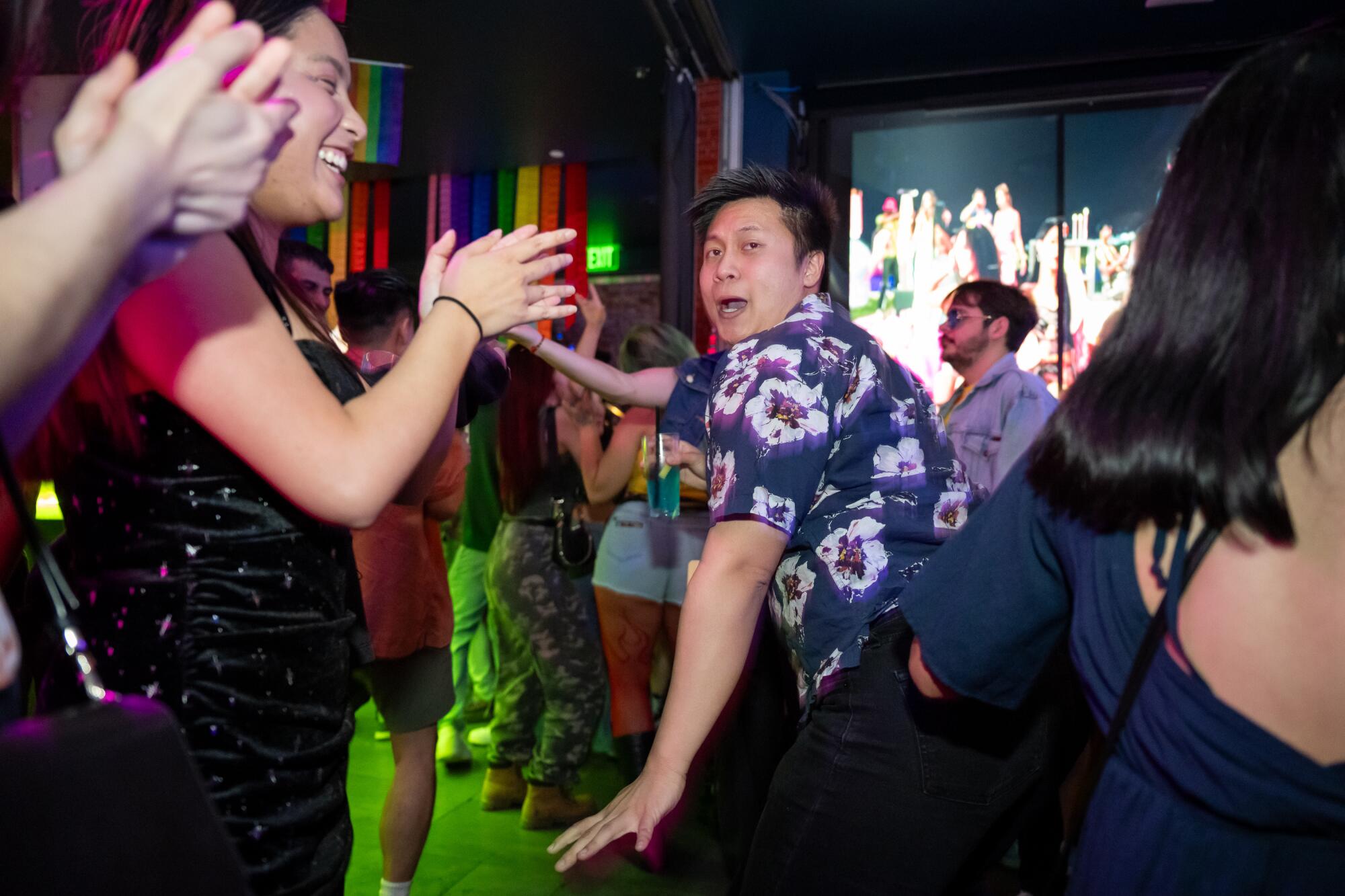
In a blue Hawaiian shirt gripping a cocktail, Cody Pham, a 24-year-old Vietnamese American accountant from Fullerton, grinned from ear to ear as he danced in front of Lausple.
He goes clubbing with straight friends in Orange County but finds the experience hard to relate to. Hip-hop music, for one, is not his taste. On this night, he had brought some female high school friends who wanted to experience the gay clubbing scene.
“I am in an environment where I feel safe expressing myself,” he said.
Then, he cut the interview short.
“Attention” by NewJeans was playing, and he couldn’t resist spinning around, laughing and dancing on the floor.
More to Read
Sign up for Essential California
The most important California stories and recommendations in your inbox every morning.
You may occasionally receive promotional content from the Los Angeles Times.
